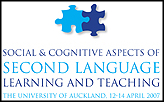


Registration
Enquiries
Rita
Schulz
Conferences & Events Ltd
Ph:
+64 4 472
0337
Fx: +64 3 546 6020
|
WELCOME
CONFERENCE DATES: April 12th - April
14th 2007
Central Conference Theme:
Investigating Social, Cognitive, or Socio-Cognitive Aspects of Second
Language Acquisition
Over recent years, researchers in the field of Second Language
Acquisition (SLA) have become increasingly concerned with questions
about the nature of second language learning, questions which have
implications both for applied linguistics and for language
teachers. For some scholars language learning is primarily a
matter of understanding how the mind works to process information, an
essentially cognitive perspective which has been hugely influential in
shaping proposals for form-focused instruction and task-based language
teaching. For other scholars, understanding language learning means
understanding how learning and learners are situated in social
contexts, a perspective which highlights such matters as learner
identities and human agency, and the roles played by culture and social
relationships in the second language classroom. For others,
understanding SLA means understanding how the social and the cognitive
necessarily work together in the creation of opportunities for
learning.
Strands: the social, the
cognitive, the socio-cognitive
For this conference we invite contributors to address (from their own
particular perspectives) either cognitive
aspects of SLA (such as attention, information processing,
explicit and implicit forms of knowledge), or social aspects of SLA (including
such matters as identity, affect and the co-construction of
knowledge).
Alternatively, participants may wish to take a more socio-cognitive
perspective, looking at any form of interdependence between cognitive
processes and aspects of the social contexts in which
language is used and learned which is significant for language
acquisition and for language teaching. For example, some scholars argue
that understanding how attention works involves understanding how its
cognitive aspects (such as how attention is constrained by the
limited capacity of short term memory) are operationalized and shaped
through social contexts of use.
Interest groups
We envisage the conference will be of interest to those who are
concerned with the social, cognitive and socio-cognitive aspects of
second language use, learning and teaching, including researchers and
language teachers.
.
|